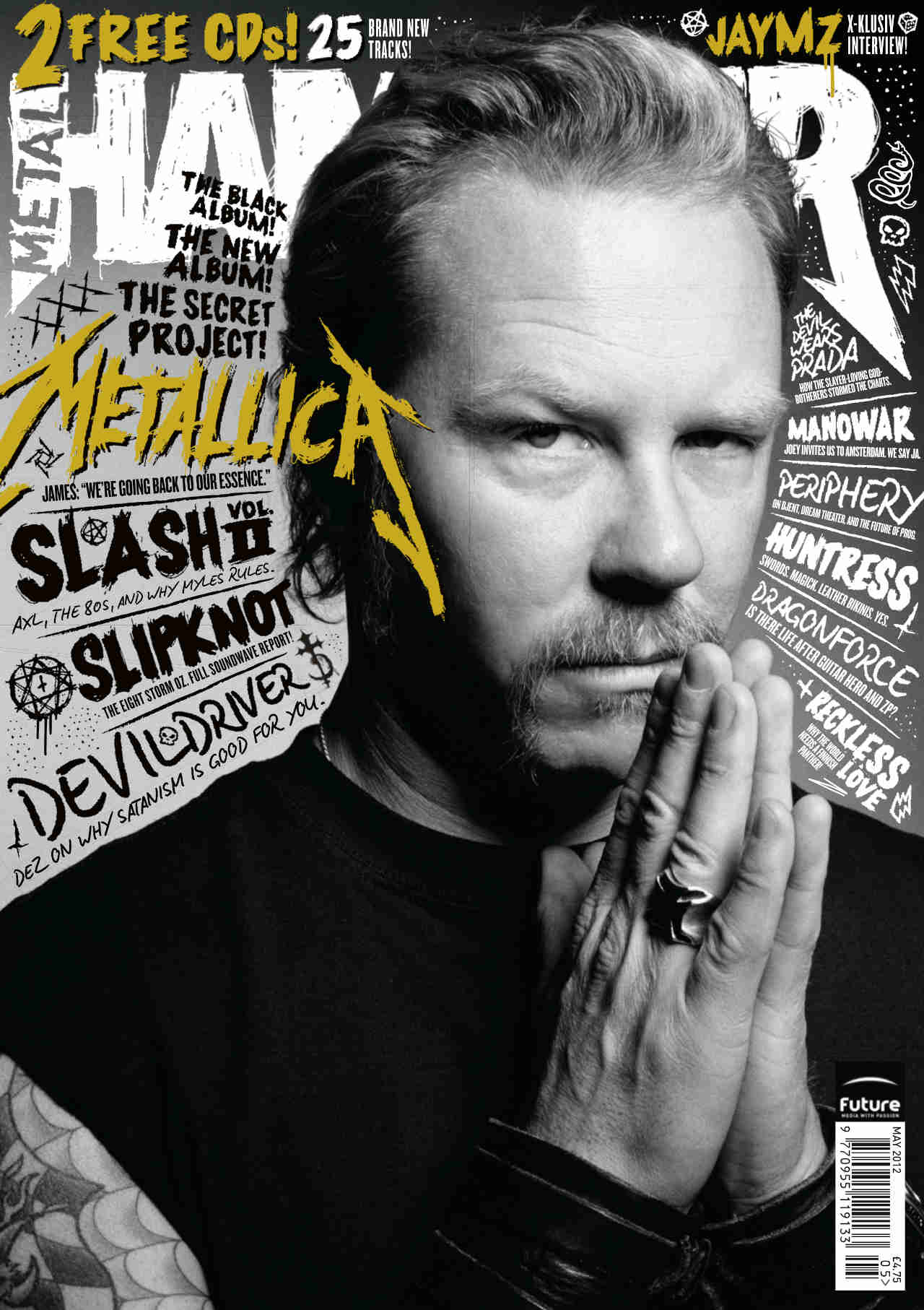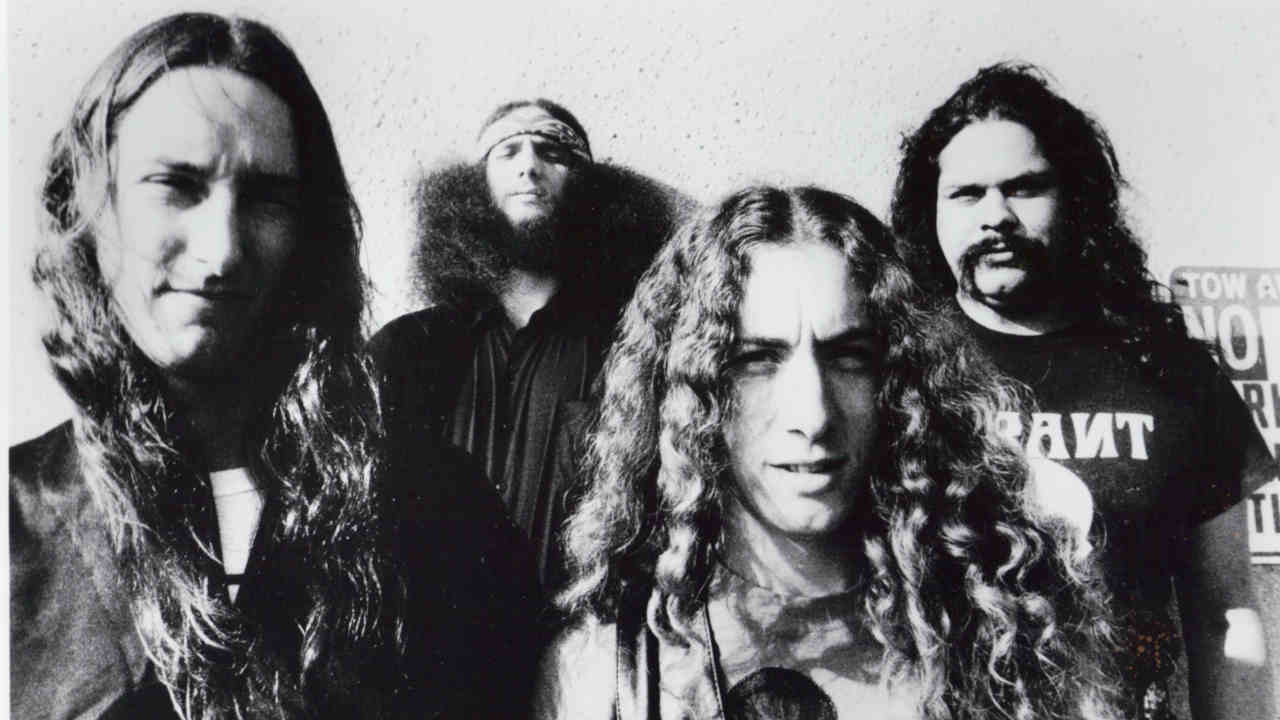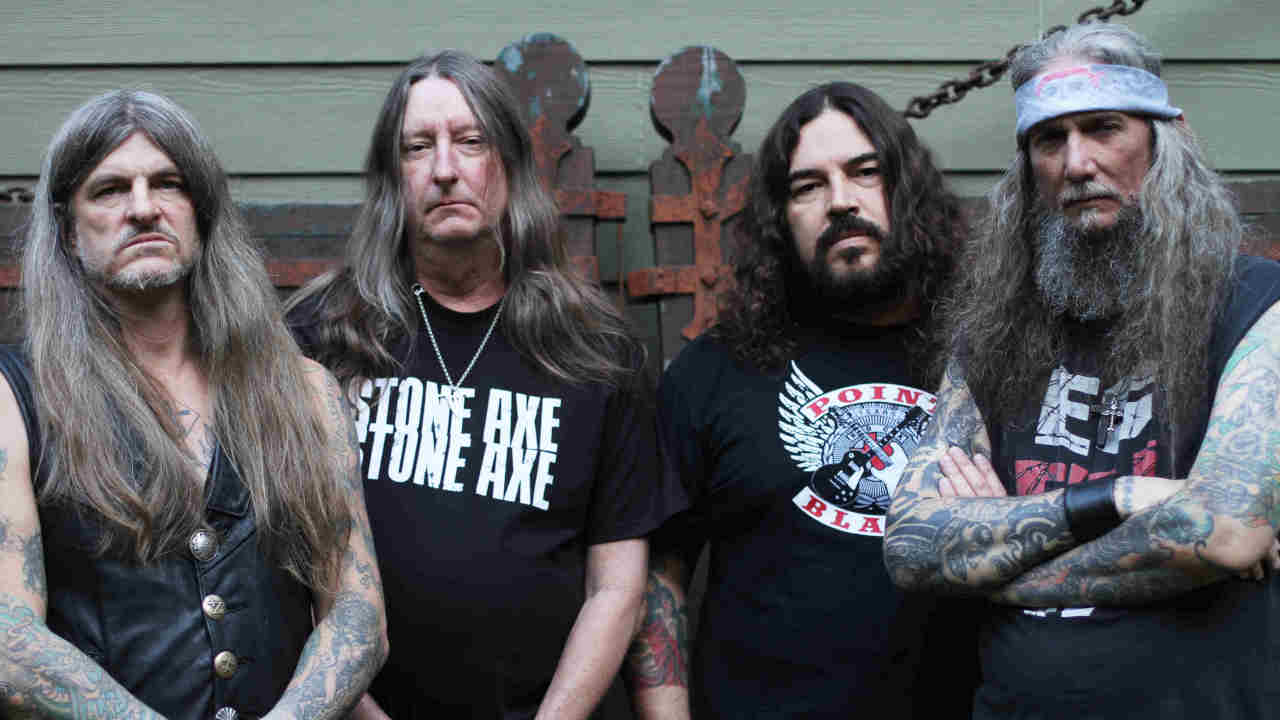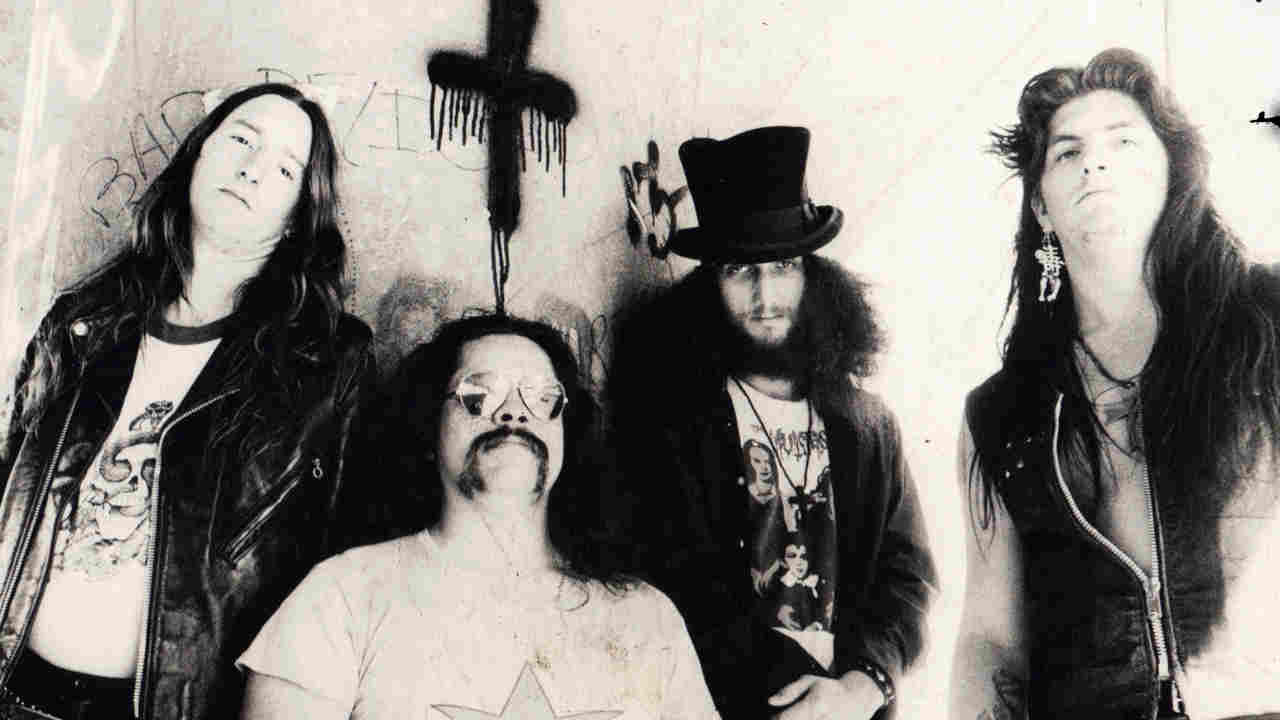Black Sabbath may have laid down the template for what became doom metal, but in the late 70s and early 80s and bunch of American bands picked up the baton and ran with it – and chief among them were LA’s Saint Vitus. In 2012, as these doom legends prepared to release their first album in 2017, Hammer sat down with linchpin guitarist Dave Chandler to talk about the band’s monumental legacy.

When we’re talking Saint Vitus, the word ‘influential’ just seems too small. Formed in LA in 1978, first as Tyrant, before switching to Saint Vitus in 1980, they were arguably the first outfit to revive the stripped-down, street-doom sound of early Black Sabbath just as Sabbath themselves were losing their way. Throughout the 80s and early 90s, they issued a series of whacked-out, ultra-lo-fi albums and EPs to almost universal indifference.
Fast-forward to the present, however, and you’ll find their very name the stuff of legend, uttered in awed, reverential tones. Their scattered discography is now at the black heart of any serious doom collection, and their infamous ‘V’ insignia has been transmuted into an alchemical talisman, worn with pride by the righteous and the worthy. As career turnarounds go, it’s been a real nose-bleeder.

In the wake of the band’s split in 1996, talk of a possible Saint Vitus reunion remained little more than chatroom chatter until the classic lineup of vocalist Scott ‘Wino’ Weinrich, guitarist Dave Chandler, bassist Mark Adams and drummer Armando Acosta (RIP) got together in 2003 for a one-off performance at Chicago’s Double Door club. It would be a further six years before they actually went back on tour, but when they hit the road at last, it was crystal clear that the band born too late and down on their luck had finally found home. Greeted by the kind of rapturous reception they could only have dreamed about back in the day, clamour for a brand new Vitus album inevitably followed. But a lingering shadow of doubt remained. Seventeen years on from the band’s swansong, Die Healing – a cast-iron classic by any reckoning – could the reactivated Vitus really rekindle the magick of yore?
“I had reservations about the writing process,” admits Dave Chandler. “I hadn’t tried to write in the Saint Vitus style for so long. Could I still do it? The expectation surrounding this actually fucked with me. I drove my wife out of her mind because I was such a prick while I was writing. I wanted to do something special and not just throw it together. But all the bull- shit that I put her and everyone else through and the pressure added to the realism of the record. We had one new song we were playing live – Blessed Night – and I had a few riffs floating around in my brain and I got them down. Then when we got together, everything worked out real quick and I was like ‘Yeah, this’ll work.’
“An album wasn’t expected when we did the reunion but people kept asking me about it. Then we played Roadburn and Hellfest and the response was overwhelming. That’s when people started asking about a new record. As we got more and more shows, we started thinking about it more. So it was completely unplanned although we’re very happy with the results.”

If bands are ever truly products of their time, then Vitus are sons of the 70s just as they are sons of Sabbath. The challenge facing them, which soon became a struggle, was just how to be a 70s band during the 80s. In many parts of the US and Europe, the 70s was a decade of grim austerity and it’s no surprise that it produced some of the grittiest and most memorable music, cinema and literature. The 80s, by contrast, were dominated by glitz, glamour and Gordon Gekko’s hollow creed, ‘Greed is good.’ In the world of metal, thrash and glam bestrode this wasteland wreaking Godzilla-like mayhem to the cheers of the (m)asses. To say the least, it was not a good time to be a doom-monger, reflecting society’s ills back on itself with an unflinching glare.
“We were definitely a 70s band stuck in the 80s,” agrees Dave. “That’s what the song Born Too Late is about. I used to say that if we’d started ’69 instead of ’79 we would’ve been better accepted. Eighties metal was definitely not what we were doin’! Especially out in the Hollywood area. We weren’t aware of anyone else like us. We’d never heard of Pentagram or Trouble. We finally started hearing about bands like that through friends and still hadn’t heard about Pentagram until we met Wino.”
Scott ‘Wino’ Weinrich hooked up with Vitus in ’86 following the departure of original vocalist Scott Reagers. His first album with the band – the mesmerising Born Too Late – took them still deeper into the everyday horrors endured and inflicted by humanity and ever further from the zero-sum zeitgeist of the era. As a result of their disenchantment with and rejection by the mainstream rock scene, Vitus wormed their way into the hardcore punk underground, a risky and unlikely move that played out surprisingly well. Sharing stages with, amongst others, fellow Californians Black Flag, Vitus soon found themselves signed to guitarist Greg Ginn’s record label, SST.
“We ended up getting into the punk rock scene ’cos the metal people hated us!” laughs Dave. “Bands like Black Flag started comin’ up around the same time and signing with SST was really good because none of the metal labels would touched us. We liked Black Flag and they were listening to Sabbath too, which is how they ‘got it’. They put us on stage with every SST band and every band that came to town. They threw us at the punks’ feet. Eventually, after we took their shit and kept coming back, it endeared us to them and they became our fanbase. We’d do a show in LA and the only long-haired people there would be our friends. It helped our reputation ’cos we were like this weird, crazy, slow band that played to punk crowds, so it was like ‘Don’t be fucking with them!’”
It’s not difficult to imagine how a punk crowd, at first perhaps bemused and maybe even bored by Vitus’s wilful obscurity and torpid tempos, might subsequently warm to their screeching feedback squalls and scathing social comment. Depression, degradation and death not withstanding, Vitus commented on nothing more often than drugs. The mind-expanding highs and soul-crushing lows of substance (ab)use have been a recurring theme throughout their career, the title of their comeback album Lillie: F-65 a reference to Dave’s childhood drug of choice (besides pot, of course) – a powerful barbiturate to which he was addicted for a while.
“A lot of it is personal experience,” he reveals. “In the 70s, my high school was like a drug store! We tried everything and it became a big influence. We saw a lotta people screwin’ up by doin’ certain drugs and I later came to write about it. Clear Windowpane is showin’ how cool it is to trip but then something like Shooting Gallery is like, you do this one and you’re gonna wind up getting gutter water to shoot up. In the 80s, drinking songs were all just about partying and having a good time and then here come Saint Vitus with Dying Inside ha ha ha! I’m not trying to preach to anyone, just talk about what’s happened to me and what I’ve seen. I don’t see any reason to bullshit people and I can’t stand people who write about stuff they’ve never experienced. I’ve never shot up heroin and I never will, but I know people who have and seen bad things happen to them.”
In keeping with the timeless and familiar themes it explores, Lillie: F-65 effortlessly recreates the signature Vitus sound; thunderous drums, throbbing bass and, of course, the day-after-Dresden drone Dave calls his guitar tone. It sounded fucked back in the 80s, but now everyone’s looking for ways to get their setup just that little bit shittier.
“We wanted to get a real heavy, bassy sound,” Dave recalls, “so I decided to just turn the bass on my guitar all the way up and take all the high out of it. That gave the rumbling sound I wanted for the power chords but when I played a lead, you couldn’t hear it. So I experimented with equalisers and treble boosters but the best solution I found was just to step on the fuckin’ wah-wah pedal! A lot of guitarists have come up to me and said, ‘I’d love to get your sound!’ and I’m like, ‘Well, just turn your treble off!’”

It’s no secret that, in the past, things weren’t always sweetness and light in the Vitus camp. The creative drives of power axis Dave and Wino clearly complemented each other but there was conflict too and, eventually, an acrimonious divorce. In 2012, the band’s long-awaited date with destiny, older and much wiser heads are in control.
“Wino and I always got on well but we butted heads creatively here and there,” says Dave. “It was a good thing as it created an oil and vinegar situation. Unfortunately, when he eventually left, nobody was getting along with anybody and we didn’t talk for a few years. This time around, we’re all on the same head level or same page or whatever. It’s really cool and a much better atmosphere. People see us and they’re like ‘You guys are smiling! What’s wrong?’ It started out good and now it’s come full circle and is even better than it was in the past.”
If there’s a certain irony in these doyens of despair grinning like Cheshire cats and getting along like a church on fire, it’s surely eclipsed by the love and respect being lavished upon the band’s legacy like so many Hawaiian garlands. Influential is one thing, iconic is another, but the guys are enjoying these precious moments with humility and good grace. Facing our own impending doom, the rest of the world has finally caught up with Saint Vitus.
“It’s flattering but a bit overwhelming,” sighs Dave. “We didn’t expect this. It’s weird – we had years of people ignoring us and then during the time we broke up, I started noticing us in books and stuff. Then we started hearing about all these doom bands coming up, saying this and that. I like the fact that doom is thriving in the underground because when we started doing it, we didn’t even know the term. There was no genre. And of course it boosts your ego when you walk into something like Hole In The Sky and people are like, ‘Whoa!’ That feels good. But stuff like us will never be main- stream. We’re still the outsiders but now we’ve got a bunch of good people outside with us!”
Originally published in Metal Hammer issue 230, April 2012
